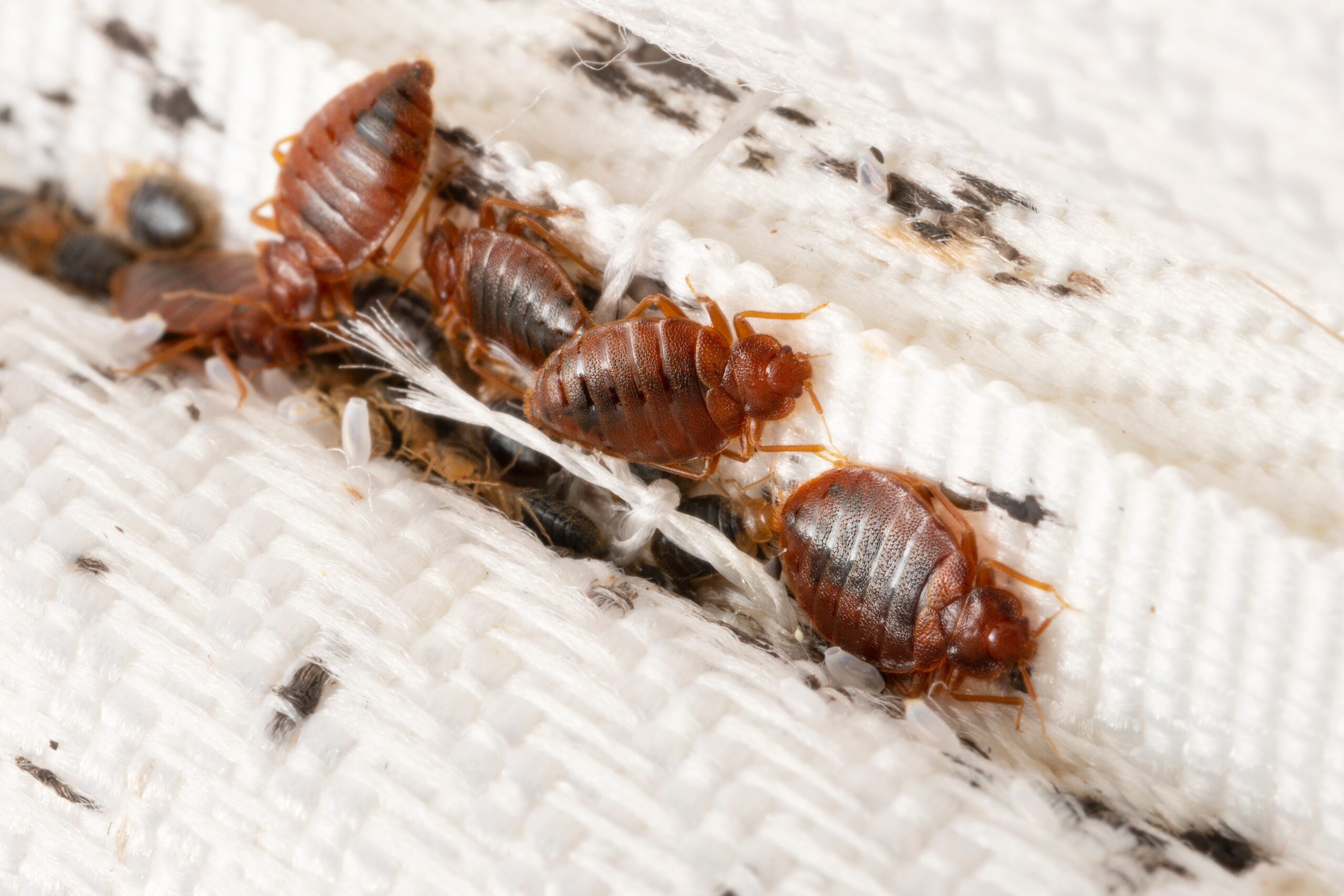How to Maintain a Pest-Free Bedroom
How to Maintain a Pest-Free Bedroom
We are now onto the third blog in our series on maintaining a pest-free home, and today’s post is all about preventing pests from invading the bedroom! Whether it’s your bedroom, your children’s rooms, or the guest room, it is essential to keep any bedroom safe from invasive pests. The bedroom is meant for complete relaxation and peace, which are two essential ingredients for a good night’s sleep. However, this makes any pest problem that much worse since it is a major intrusion on your otherwise peaceful night routine. Pests love bedrooms because these spaces are so quiet and set apart from the heart of the home, which means they are more likely to go undetected if they find the right hiding spot within the room. Let’s take a look at four of the most common bedroom pests, then explore the most efficient ways to prevent pests from overtaking any bedroom in your home.
Common Bedroom Pests

Any pest could technically be found in a bedroom, but there are some species in particular that seek out the sanctuary of this room. Certain bloodsucking pests like to hang out in bedrooms because they catch on to the fact that they are guaranteed a meal every night. Other common pests love the fact that the bedroom is typically quieter than other rooms, so they can isolate themselves and begin to establish their new home. Bedrooms also tend to collect the daily clutter that we don’t want in the living room, which adds an entirely new selection of pest hiding spots to the room.
- Bed Bugs: A list of common bedroom pests would not be complete without bed bugs. They don’t only live in beds, but the mattress is definitely one of their favorite spots because they are more likely to find a daily meal. Bed bugs are nocturnal and emerge at night to feed, but they can survive without a meal for over a year. Although they don’t spread diseases, their bites are red and itchy for just about everyone who is bitten by them.
- Spiders: Spiders are essentially the complete opposite of bed bugs in that spiders want nothing to do with us. They often enter through cracks and crevices in the house, then seek out a dark, quiet place to stay. Spiders only live where they have a reliable food source (aka insects), so their presence is usually a sign that there is an existing pest problem nearby. Since spiders are so independent, finding more than one in your home is a likely sign that there is a spider issue that needs to be professionally addressed.
- Rodents: If you have a rodent problem in your bedroom, it will be far more obvious than other kinds of pest problems. They are nocturnal and do most of their scavenging at night, so it is common to hear scratching and squeaking sounds emanating from their nesting place. Rats and mice can both fit in the smallest of gaps, so they can seek out any holes in the house and travel through these to live within the wall voids of the room. Their teeth are strong enough to chew through most household materials, so rodents can do quite a bit of damage if they are not controlled soon enough.
- Silverfish: This may seem like a random bedroom pest, but considering the fact that silverfish love staying hidden and prefer to eat anything with starch, bedrooms have a lot to offer for these strange pests. Silverfish are silver in color and have antennae that are the length of their body. They are often found in humid or temperate spaces, and like to hide within idle furniture and items. These insects eat anything starch-heavy, and their favorites include books, papers, wallpaper, glue, and dead insects. If you start finding random holes in your favorite books, it could be the work of silverfish.
Thankfully, there are many ways to prevent pests from camping out in your bedroom. Just as with any other room in the home, all it takes is a bit of time and energy spent on completing some chores that will eliminate many of the attractions for common pests. You may already do most of these tasks on a regular basis, but you would be surprised at how much of difference average chores make in preventing pests. It’s not a guarantee that doing these chores will completely prevent pests forever, though the number of creepy-crawlies invading your bedroom should certainly be much fewer than if the room is never cleaned.
Inspect the Bed
The bed is the focal point of the bedroom (clearly), so it makes sense why it is often invaded by pests. Bloodthirsty pests, including fleas and bed bugs, like to live anywhere in a bed because it puts them closer to a consistent food source. Other pests, like clothes moths and carpet beetles, like to eat the fibrous bedsheets. You may already have a routine for changing your bedsheets, but if you don’t, we recommend getting into the habit of regularly washing and changing your sheets. Make sure to use hot water when washing your bedsheets to effectively sanitize them. Dead skin cells and bacteria naturally gather in our beds over time, so washing the sheets and comforter/duvet cover/quilt keeps them free of those pest attractants. Plus, who doesn’t love the feeling of sleeping in clean sheets?
Clean the Floor
As tedious of a chore as this is, it’s important to keep your floors clean in order to prevent pests. There are plenty of attractants they find on a “dirty” floor — dust, hair, dander, crumbs, etc. — that would motivate them to invade for the food and stay for the shelter. Dust mites, carpet beetles, crickets, roaches, and ants can all find things to love on an unkempt floor. The proper cleaning method depends on the type of flooring you have in the bedroom. If you have hardwood or tile, a good sweeping and mopping of the space should do the trick. Carpeting and rugs can be vacuumed, as well as spot-cleaned when spills occur. Also, try to keep the general clutter that collects on the floor to a minimum. You don’t have to keep your bedroom completely spotless in order to prevent pests, but tidying up every day or every other day is an efficient way to keep the attractants down to a minimum.
Do the Laundry
Speaking of monotonous chores, staying on top of the laundry is another essential task in preventing pests. The key to keeping pests from living within your laundry is to not let it pile up for too long. The longer that dirty laundry sits (especially if it has stains), the larger of a risk you run of attracting pests. There are a surprising amount of pests that eat from stained and worn clothing, including crickets, carpet beetles, clothes moths, roaches, and silverfish. Pests don’t like to live in a place that is constantly moved, and won’t want to live in a pile of laundry that you shuffle around every day. They will not invade a laundry hamper or basket that you use and empty often, so having a regular laundry routine should be sufficient in keeping pests out. We recommend keeping your dirty laundry in a hamper or container with a lid, as this will add another barrier in between your clothes and any pests. If you have the habit of leaving clothes strewn around your bedroom, try folding and keeping them in one spot where you can monitor them for any nosy pests.
Inspect Pet Areas
Many pet owners like to keep their furry friends in the bedroom at night so that everyone can get a good night’s sleep in the most comfortable space. Unfortunately, our dogs and cats have the risk of picking up some hitchhiking pests throughout the day, thanks to their fur that is typically thick enough to hide tiny insects. This is especially true when the animal is outdoors for most of the day, as most bloodsucking pests hide in grass and other plants while they wait for an unsuspecting mammal to venture nearby. Fleas and ticks commonly attach themselves to cats and dogs that spend more time in the thick brush that they hide within. Fleas in particular look like black specks on light-colored surfaces, and they also leave dark-colored droppings (flea dirt) that act as evidence of their presence. If your pet sleeps in your bedroom, check their bed, blanket, and favorite areas of the floor for any signs of invasive pests. It’s also a good idea to inspect your own bed for any pests that may have ventured away from their original host, especially if your pet sleeps with you. If you find any pests living within your pet’s bedding, dispose of it immediately and inspect your pet for any hitchhiking pests. While we’re on the subject of pets, don’t keep their food stored in your bedroom if you can help it. There are even more pests that love dry dog or cat food, such as roaches, ants, and rodents. You have enough worries as a pet owner, so the last thing you need is to find out that you’ve been sharing a bedroom with more creatures than just your furry friend!
Check the Seals
And we’re not talking about the animals down by the wharf. It is normal for the seals on our windows and sliding doors to wear down over time, especially if you live in an area that experiences some extreme weather throughout the year. Any small pest can work their way inside a loosely sealed window or door, so if you suddenly find your bedroom full of random pests, it could be because they find an opening in these areas. We suggest checking the seals on any bedroom windows and sliding doors at the start of every season, in the event that the previous season rendered the seals unless. You can use caulk to fill in smaller gaps, but it is a good idea to replace any seals or weather stripping that are no longer functional. Also, while you are inspecting these windows and doors, we recommend checking all of the screens for any holes or tears. A torn window screen could lead to you allowing in more than just the cool breeze at night, since this is an easy access point for all kinds of pests. You can patch small holes with extra screen material, but a screen that is full of imperfections should probably just be replaced. There are countless online tutorials on how to complete screen or seal repairs if you want to have a new DIY project on your hands.
Clear Out Trash and Dishes
Everyone has their own intrinsic rules for their bedroom. Some find it perfectly fine to enjoy a midnight snack while laying comfortably under the covers, while others would never dream of eating a speck of food anywhere near their bedroom. If you ask our opinion — and we assume that you are if you’re reading this — we suggest refraining from eating anything in your bedroom as much as possible. It just adds the risk of hungry pests finding any crumbs or spills that escaped your watch, and the last thing you need is a horde of ants or rodents finding a reliable food source in your bedroom. If you do need to eat in your bedroom, try to be careful not to spill anything. Clean up any crumbs after you are done, then dispose of any food trash and dirty dishes in the kitchen. These food remnants can also attract pests if they are left out long enough, so the ideal goal is to remove all traces of food from your bedroom before the smell draws in pests.
Trim the Landscaping
If there are any plants right outside your bedroom window, they have the potential to be more than just a pretty view from your room. Overgrown plants, tree branches, and bushes will provide a direct highway from the yard to your room once they touch the window. As with any greenery directly outside the house, make sure that everything is trimmed back enough that it is not touching any part of the windows or structure. Also, if you have a lawn that is anywhere near the house, make sure it gets mowed before it becomes overgrown. Ants, crickets, and grasshoppers love living in tall grass, and they will be drawn to the light and heat emanating from your bedroom window every night that they reside in the yard. A bonus of doing some basic yard work around the exterior of your bedroom is that it gives you the perfect opportunity to inspect the outside of your windows and walls for any holes, cracks, and gaps that tiny pests could easily use as entry points into your peaceful space.
Dust Everything
It’s unfortunately easy for dust to accumulate in bedrooms because we spend quite a bit of time there. Dust is made of dead skin cells, hair, bacteria, and other kinds of particles. We naturally create dust by living in an indoor space for an extended amount of time, so that’s why our living rooms and bedrooms seem to show dust the fastest. Dust mites predictably love rooms that have a large amount of dust because they have an unending buffet of their favorite food, so it’s a good idea to prevent these microscopic pests from setting up shop here. You might already take the time to dust any shelves, knick-knacks, and picture frames that reside in your room, but there are more items that need to be dusted than you may think. Some of the largest pieces in a bedroom are also the ones that accumulate the most dust, which means they need a good dusting every so often. We recommend taking the time to dust large items such as the blinds, curtains, lampshades, lights, dresser, and headboard. You can either use a duster and vacuum the floor afterwards to clean all of the fallen dust, or you can go straight for the vacuum and use the attachments to clear the dust from these items. Either way, the idea of clearing your bedroom of a dust mite’s main food source is a sweet dream indeed.
Count Sheep Instead of Pests, Thanks to Green
The last thing you need in the room meant for sleeping is to share it with a bunch of invasive pests. There is nothing quite so nightmare-inducing as going to turn out your light for the night, only to find yourself looking straight into the eyes of a spider (or any other creepy-crawly). This is why the experienced technicians of Green Pest Services are dedicated to keeping local homes pest-free in every season. You deserve to get a good night’s sleep without worrying about a horde of pests invading your bedroom, and we get to the root of every pest issue in order to make that happen. All of our treatments are completely safe for both people and pets, so you don’t have to add toxic pesticides to your list of concerns when you go Green. Between our attentive inspections and our personalized treatment plans, we guarantee that we will solve your pest problems as efficiently as possible. Contact us today for a free quote on our reliable pest control services that will leave you dreaming of our effective solutions, not frightening pests!
Citations
Bennett, J. (2022, November 21). How to clean your bedroom in an hour for a more restful space. Better Homes & Gardens. Available at https://www.bhg.com/homekeeping/house-cleaning/tips/quick-clean-bedroom/ (Accessed on September 19, 2023).
Common bedroom insects. (n.d.). Pest World. Retrieved September 19, 2023, from https://www.pestworld.org/pest-in-the-house/bedroom/
Common bedroom pests. (2020, February 5). Maggie’s Farm. Retrieved September 19, 2023, from https://maggiesfarmproducts.com/blogs/bug-help/common-bedroom-pests
Shiffer, E.J. (2022, October 17). 15 common house bugs and how to identify them, according to insect experts. Prevention. Available at https://www.prevention.com/life/g30548446/common-house-bugs/ (Accessed on September 19, 2023).

